Bitcoin
‘Game On For Bitcoin!’ Musk’s DOGE Questions Gold Reserves

In a weekend exchange on X, Elon Musk was nudged to extend his cost-cutting Department of Government Efficiency (DOGE) to one of the most heavily guarded sites in the United States: Fort Knox, the US Army installation famously said to hold 4,580 tons of gold. The discussion, which drew in voices ranging from the Bitcoin community to sitting lawmakers, has reignited decades-old questions about the transparency and actual contents of America’s gold vault.
Musk Sparks The Conversation
It all began when financial news aggregator Zerohedge (@zerohedge) tagged Musk, suggesting, “It would be great if @elonmusk could take a look inside Fort Knox just to make sure the 4,580 tons of US gold is there. Last time anyone looked was 50 years ago in 1974.”
The tweet, viewed by 1.9 million users and liked over 59,000 times, prompted Musk to ask: “Surely it’s reviewed at least every year?” Zerohedge promptly replied: “It should be. It isn’t.”
From there, the online community swelled with reactions, speculation, and suggestions. Questions about the last comprehensive audit of the Fort Knox depository have resurfaced, along with persistent rumors that the stash has been sold off or otherwise depleted.
Not long after, Sen. Rand Paul (R-Ky.), 62, joined the conversation with a succinct endorsement of a formal inspection, remarking: “Nope. Let’s do it,” in response to Musk’s musings. Paul’s father, former Rep. Ron Paul (R-Texas), has a long history of calling for greater transparency around the United States’ gold reserves. Back in the 1970s, Ron Paul famously raised concerns that the gold might not be as secure—or as plentiful—as long believed.
The most recent known visits to Fort Knox appear to be in 1974, when journalists and members of Congress were permitted to step inside, and 2017, when the facility briefly opened its doors to former Treasury Secretary Steve Mnuchin. Even so, there is no publicly available record of a full, comprehensive audit in recent decades, fueling conspiracy theories that the gold may not be in Fort Knox at all.
Estimates suggest that if the vault does indeed hold 4,580 tons of gold, it would be worth approximately $425 billion at current market rates.
Implications For Bitcoin
The spark of skepticism around Fort Knox’s holdings quickly fed into a larger conversation about Bitcoin’s verifiability. Nate Geraci, President of the ETF Store and Co-Founder of the ETF Institute, remarked how BTC could eliminate doubts over ownership. “If only there were a technological solution that would allow anyone to independently verify ownership of an asset,” Geraci said, adding, “Btw, if for whatever reason Ft Knox doesn’t actually have the gold… It’s absolutely game on for btc. IMO, the gold is there. But at least now everyone might fully appreciate real-time & foolproof verification of asset ownership.”
Others echoed that sentiment. Dennis Porter, CEO and founder of Satoshi Act Fund, emphasized Bitcoin’s around-the-clock transparency: “Another reason why states (and the federal government) should prefer Bitcoin instead of gold. The public can audit government-bitcoin-holdings 24/7/365. The last extensive audit of our gold reserves happened… over 70 years ago.”
Meanwhile, US Senator Cynthia Lummis, a longtime Bitcoin advocate who serves as the Senate Banking Subcommittee Chair on Digital Assets under US President Donald Trump, underscored the necessity for a modernized approach: “Bitcoin fixes this. A bitcoin reserve could be audited any time 24/7 with a basic computer. It’s time to upgrade our reserves.”
Some took the scenario to imaginative extremes, predicting potential outcomes if a Fort Knox audit revealed significantly less gold than is officially reported. Walker, host of THE Bitcoin Podcast, posted a detailed hypothetical chain of events, beginning with an Elon Musk-inspired audit, followed by a discovery that Fort Knox holds “less than 500 tons of gold.”
From there, he speculated an executive order might be issued by Trump to form a Strategic Bitcoin Reserve, triggering international competition for Bitcoin while undermining gold’s market standing. By the end of Walker’s sweeping scenario, “China and Russia realize Trump got the jump on them and start trying to acquire Bitcoin,” leading to a collapse in gold’s value relative to Bitcoin—while vocal gold proponent Peter Schiff becomes, as Walker put it, “admitted to a mental hospital.”
Here’s what’s going to happen:
1. Elon pushes Trump to audit Fort Knox.
2. Audit reveals there is less than 500 tons of gold.
3. Trump realizes China and Russia have way more gold than the U.S., but very little Bitcoin.
4. Trump issues EO for Strategic Bitcoin Reserve, citing… pic.twitter.com/hQrAk7vMj1— Walker⚡️ (@WalkerAmerica) February 16, 2025
Eric Balchunas, a Bloomberg ETF analyst, responded to Walker’s bold prophecy with measured skepticism, asking: “What a prediction. What % chance would you give of this actually happening?”
Whether these audits come to fruition remains unclear. As of this writing, there has been no official confirmation from the US Treasury or the Department of Defense to open Fort Knox for a comprehensive public review. Still, a Fort Knox audit could have massive implications for the gold price and also potentially for the digital gold, Bitcoin.
At press time, BTC traded at $96,383.
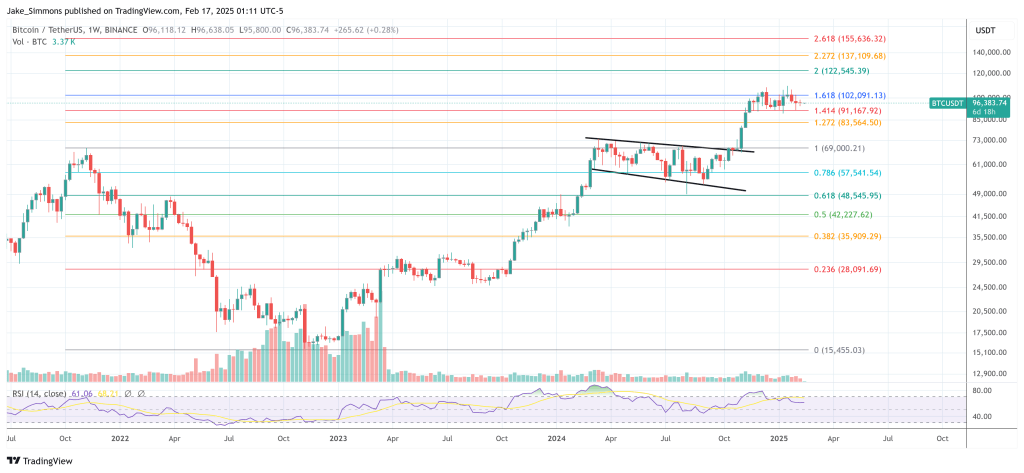
Featured image created with DALL.E, chart from TradingView.com
Bitcoin
What Does This Mean for Altcoins?

Bitcoin’s (BTC) market dominance has surged to 64%, reaching its highest level in over four years.
However, experts remain divided on what this means for the future. Some predict an impending altcoin season, and others caution that Bitcoin’s dominance could continue to suppress altcoins.
What Does Bitcoin’s Rising Dominance Mean?
For context, Bitcoin dominance (BTC.D) refers to the percentage of the total cryptocurrency market capitalization that BTC holds. It is a key indicator of Bitcoin’s market strength relative to other cryptocurrencies. A rising dominance suggests that Bitcoin is outperforming altcoins, while a decrease may signal growing interest or investment in other digital assets.
The metric has been steadily increasing since late 2022. As of the latest data, it surged to 64%, marking highs last seen in early 2021.

Notably, Benjamin Cowen, founder of Into The Cryptoverse, highlighted that the number is much higher when excluding stablecoins.
“Excluding stable coins, Bitcoin dominance is now at 69%,” Cowen revealed.
The rise in Bitcoin dominance has sparked debate among analysts about its implications for altcoins. Cowen believes there will be a correction or downward movement in altcoins before any substantial gains can be expected in the market. This implies that the altcoin season may not be imminent yet.
“I think ALT/ BTC pairs need to go down before they can go up,” he stated.
Nordin, founder of Nour Group, also expressed caution. He stressed that Bitcoin dominance is nearing the levels seen during the peak of the 2020 bear market.
“This isn’t just a BTC move. Its capital rotating out of alts,” he noted.
Moreover, Nordin warned that a break above 66% could intensify selling pressure on altcoins. This, in turn, could delay the altcoin season.
“Bitcoin dominance back to 64%. No Alt seasons in 2024 or 2025,” analyst, Alessandro Ottaviani, predicted.
On the other hand, analyst Mister Crypto predicts that Bitcoin’s dominance may follow a long-term descending triangle pattern. A descending triangle typically suggests bearish momentum, where the price or dominance gradually decreases as lower highs are formed.
However, this could prolong its market control before a broader correction allows altcoins to gain traction.
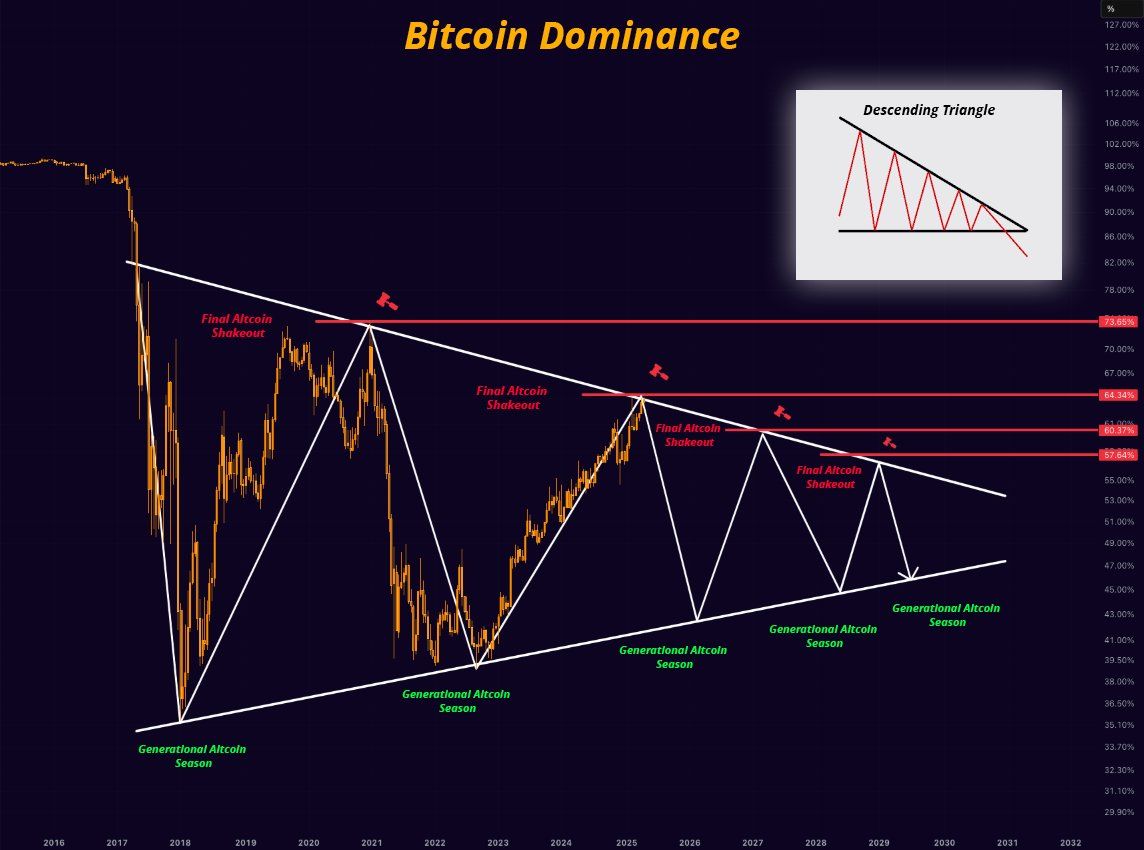
Another analyst mentioned that Bitcoin dominance is currently testing the resistance zone between 64% and 64.3%. Therefore, a possible retracement may be on the horizon. Should this retracement occur, altcoins could begin to gain traction, with some potentially emerging as top performers in the market as capital shifts away from Bitcoin.
“However, a breakout from this zone could mean further declines for alts,” the analyst remarked.
Finally, Junaid Dar, CEO of Bitwardinvest, offered a more optimistic view. According to Dar’s analysis, if Bitcoin’s dominance drops below 63.45%, it could trigger a strong upward movement in altcoins. This, he believes, would create an ideal opportunity to profit from altcoin positions.
“For now, alts are stuck. Just a matter of time,” Dar added.
Tether Dominance Signals Potential Altcoin Season
Meanwhile, many analysts believe that the trends in Tether dominance (USDT.D) signal a potential altcoin season. From a technical analysis standpoint, USDT.D has reached a resistance zone and may be due for a correction, suggesting the possibility of capital flowing from USDT into altcoins.
“The USDTD is in a rejection zone, as long as it does not close above 6.75% it will be favorable for the market,” a technical analyst wrote.
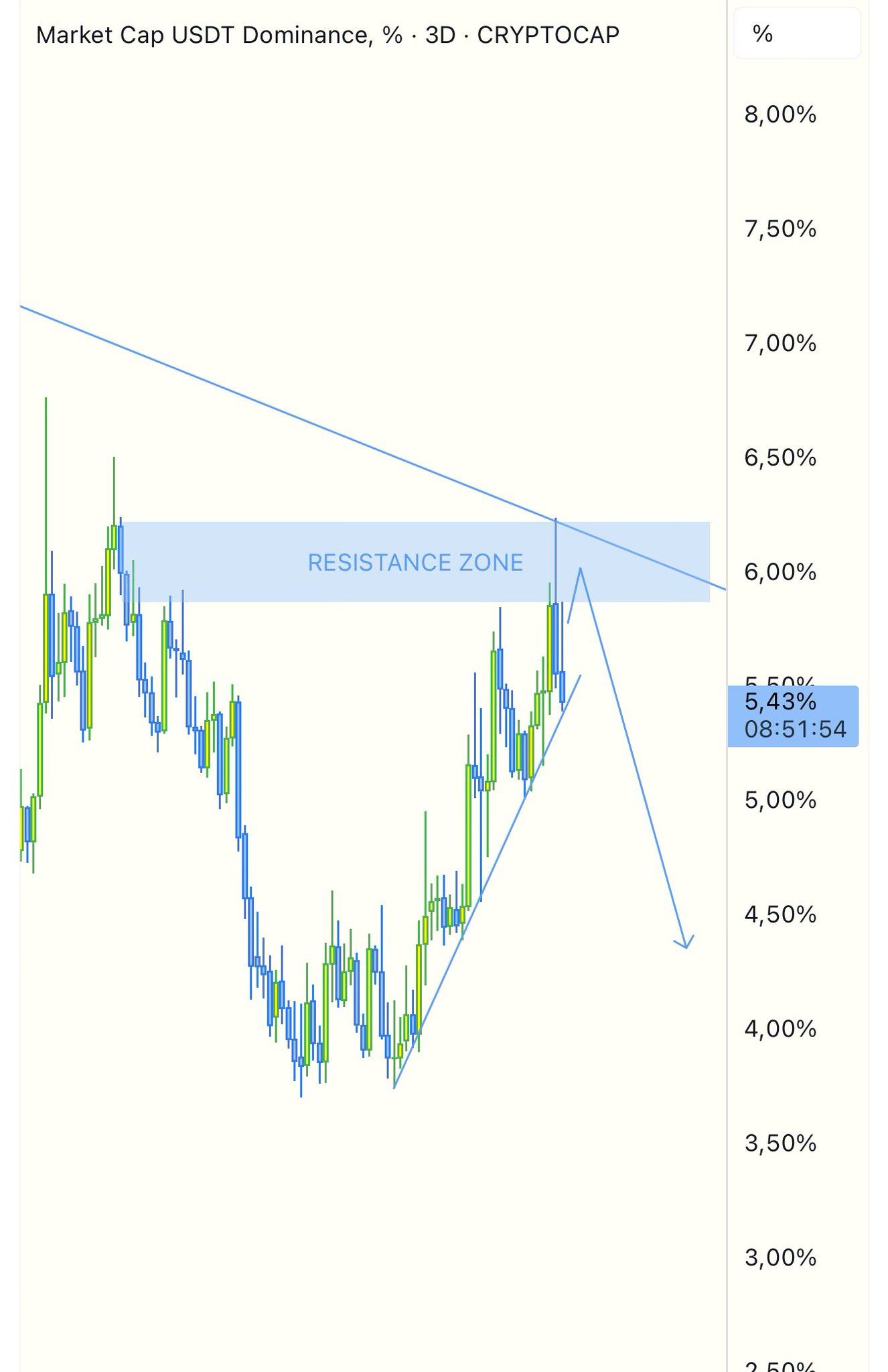
Another analyst also stressed that the USDT.D and USD Coin dominance (USDC.D) have reached resistance, forecasting an incoming altcoin season. Doğu Tekinoğlu drew similar conclusions by observing the combined chart of BTC.D, USDT.D, and USDC.D.
As Bitcoin’s dominance climbs, investors are closely monitoring these technical and on-chain signals. The interplay between Bitcoin’s strength and stablecoin dynamics could dictate whether altcoins stage a comeback this summer or face further consolidation. For now, Bitcoin’s grip on the market remains firm.
Disclaimer
In adherence to the Trust Project guidelines, BeInCrypto is committed to unbiased, transparent reporting. This news article aims to provide accurate, timely information. However, readers are advised to verify facts independently and consult with a professional before making any decisions based on this content. Please note that our Terms and Conditions, Privacy Policy, and Disclaimers have been updated.
Bitcoin
Babylon’s TVL Drops 32% After Massive Bitcoin Unstaking

Babylon, a platform enabling native Bitcoin (BTC) staking, recorded a notable unstaking event on April 17. Approximately $1.26 billion worth of BTC was withdrawn from the protocol.
The move resulted in a significant decline in Babylon’s total value locked (TVL). Moreover, the price of its native token, BABY, also dipped.
Babylon’s TVL Drops 32% After Massive BTC Unstaking
Blockchain analytics firm Lookonchain alerted users about the unstaking on X (formerly Twitter).
“About 5 hours ago, 14,929 BTC($1.26 billion) was unstaked from Babylon,” the post read.
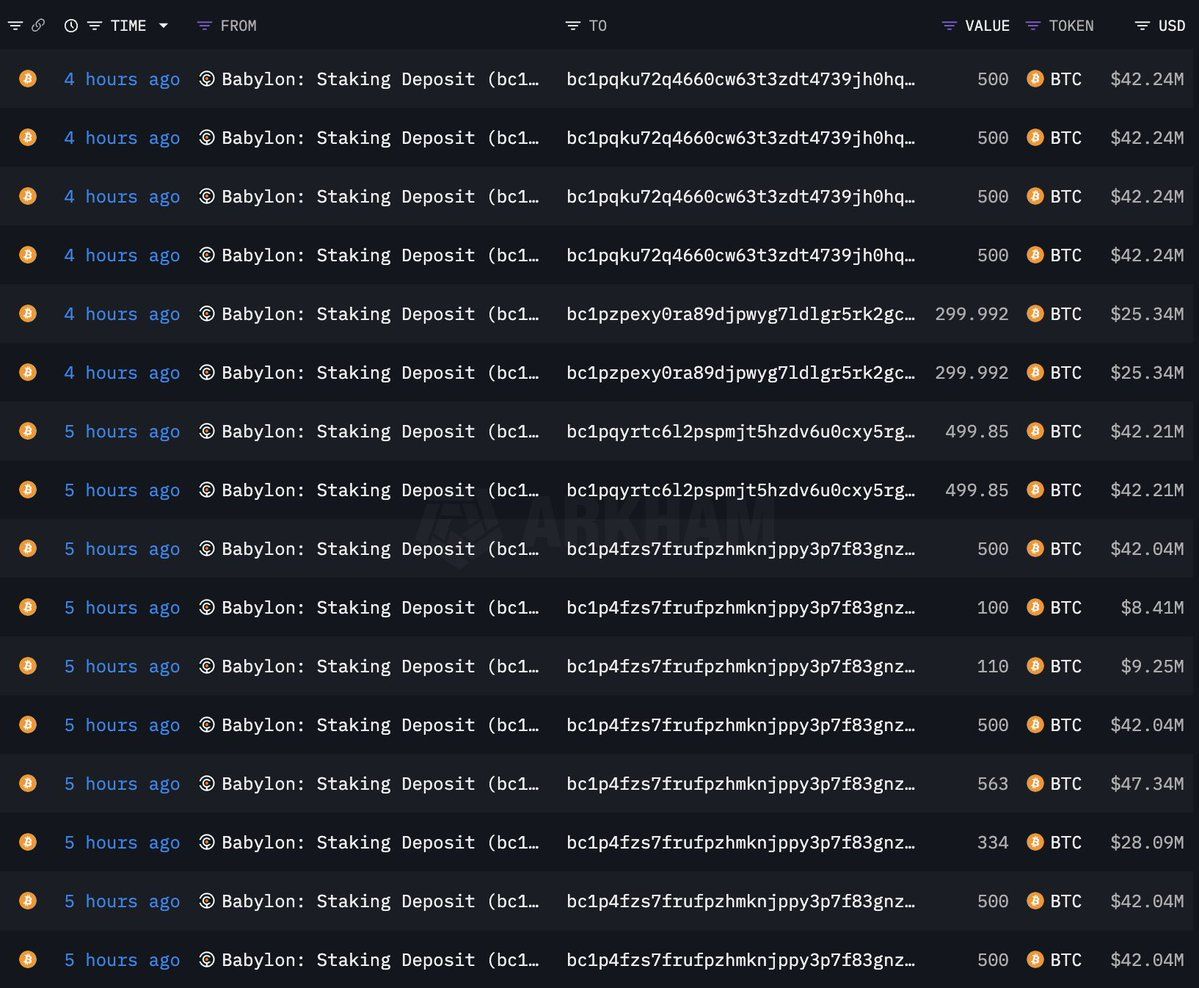
This move triggered a sharp drop in the platform’s TVL. According to data from DefiLama, Babylon’s TVL dropped from $3.9 billion to $2.6 billion in just a day, representing a decline of 32.7%. Moreover, only 31,502 BTC remain staked in the protocol at press time.
That’s not all. The BABY token was also not immune to market pressures. According to BeInCrypto data, the token depreciated by 9.8% over the past day alone. At the time of writing, the altcoin was trading at $0.8.

The unstaking led to widespread speculation about the platform’s stability and the broader implications for Bitcoin-based decentralized finance (DeFi) protocols.
“What’s going on. I don’t waste my time partaking in staking BTC, but this can be concerning. You don’t just see so much unstaking in such a short window,” a user said.
Nonetheless, Lombard Finance quickly moved to calm investor concerns. The Bitcoin restaking protocol, built on Babylon, clarified that the withdrawal was part of a planned transition to a new set of finality providers.
“To carry out the transition to our new set of Finality Providers, the Lombard Protocol has begun the process of unstaking BTC from the Lombard Finality Provider,” Lombard Finance stated.
The post emphasized that this process was a necessary step in the evolution of the platform. In addition, the company reassured investors that the withdrawn funds are expected to be restaked once the unbonding process concludes.
The unstaking event follows closely on the heels of Babylon’s airdrop earlier this month. 600 million BABY tokens—representing 6% of the token’s total supply—were distributed to early adopters, including Phase 1 stakers, Pioneer Pass NFT holders, and contributing developers.
Shortly after the airdrop, $21 million worth of Bitcoin was unstaked within 24 hours. This suggests a pattern of capital withdrawal that has intensified with the latest event.
Disclaimer
In adherence to the Trust Project guidelines, BeInCrypto is committed to unbiased, transparent reporting. This news article aims to provide accurate, timely information. However, readers are advised to verify facts independently and consult with a professional before making any decisions based on this content. Please note that our Terms and Conditions, Privacy Policy, and Disclaimers have been updated.
Bitcoin
What Good Friday Options Expiry Means for Bitcoin & Ethereum

On Good Friday, over $2.2 billion worth of Bitcoin and Ethereum options contracts expire today.
It comes as crypto markets continue to reel from macroeconomic uncertainty. President Donald Trump is pressuring the Federal Reserve (Fed) to cut interest rates, but the chair, Jerome Powell, will not budge.
Over $2.2 Billion Options Expire Today
Today, April 18, amid Good Friday celebrations, 23,221 Bitcoin (BTC) options contracts will expire. The notional value for this Friday’s tranche of expiring Bitcoin options contracts is $1.966 billion, according to data on Deribit.
The put/call ratio is 0.96, suggesting a prevalence of purchase options (calls) over sales options (puts).
As the Bitcoin options expire, they have a maximum pain or strike price of $82,000; at this point, the asset will cause the greatest number of holders’ financial losses.
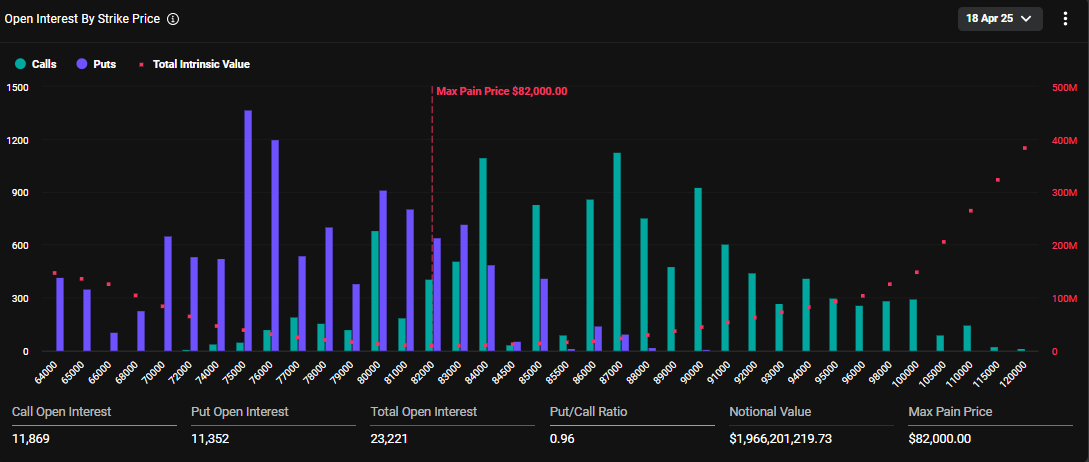
Similarly, crypto markets will witness the expiry of 177,130 Ethereum contracts, with a notional value of $279.789 million. The put-to-call ratio for these expiring Ethereum options is 0.84, with a maximum pain of $1,600.
This week’s options expiry event is slightly smaller than what crypto markets witnessed last week on Friday. As BeInCrypto reported, approximately $2.5 billion worth of BTC and ETH options expired then, with short-term dips bringing put demand.

Traders and investors must closely monitor today’s developments as options expiry could lead to price volatility. Nevertheless, put-to-call ratios below 1 for Bitcoin and Ethereum in options trading indicate optimism in the market. It suggests that more traders are betting on price increases.
Meanwhile, analysts at Deribit highlight low volatility and flat skew. While this suggests a calm market, historical data from CoinGlass suggests post-expiry price swings are common, potentially signaling an upcoming move.
“With volatility crushed and skew flat, is the market setting up for a post-expiry move?” they posed.
Blackswan Event Likely, Greeks.live Analysts Say
Analysts at Greeks.live shed light on current market sentiment, echoing the calm outlook. However, they note that the market is predominantly bearish to neutral. Traders expect continued choppy action before potentially revisiting $80,000 to $82,000.
As of this writing, Bitcoin was trading for $84,648, slightly above its strike price of $82,000. Based on the Max Pain theory, prices will likely move toward this strike price as options near expiry.
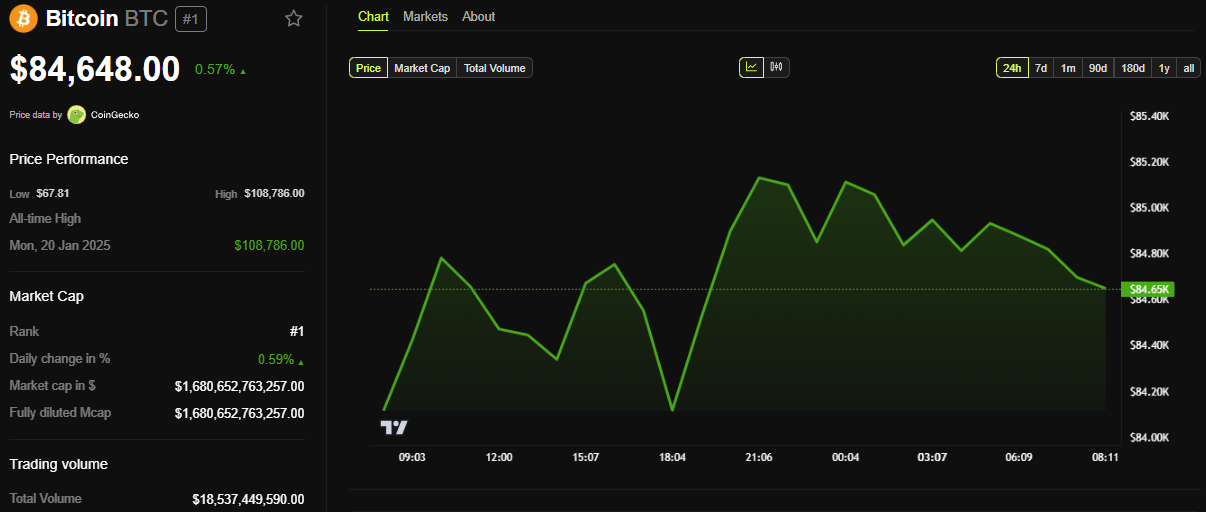
Citing a mild sentiment, Greek.live analysts ascribe the calm to Trump not putting out a lot of news this week. Nevertheless, they anticipate more trade wars, heightened uncertainty, and volatility.
“We expect the trade and tariff wars to be far from over, and the uncertainty in the market will continue for a long time, as will the volatility in the market,” Greeks.live wrote.
They also ascribe the outlook to Powell’s comments, which created downward pressure as 100 bps rate cut expectations for the year were reduced. This led to crypto correlation with traditional markets.
Against this backdrop, Greeks.live says the probability of a black swan event is higher, where a rare, unexpected event that has a significant and often disruptive impact on the market occurs.
“…it is now a period of pain when the bulls have completely turned to bears, and investor sentiment is relatively low. In this worse market of bulls turning to bears, the probability of a black swan will be significantly higher,” they explained.
They urge traders to buy out-of-the-money (OTM) put options. An option is classified as out-of-the-money when its strike price is less favorable than the current market price of the underlying asset. This means it has no intrinsic value, only time value (the potential for it to become valuable before expiration).
Disclaimer
In adherence to the Trust Project guidelines, BeInCrypto is committed to unbiased, transparent reporting. This news article aims to provide accurate, timely information. However, readers are advised to verify facts independently and consult with a professional before making any decisions based on this content. Please note that our Terms and Conditions, Privacy Policy, and Disclaimers have been updated.
-

 Ethereum23 hours ago
Ethereum23 hours agoEthereum Investors Suffer More Losses Than Bitcoin Amid Ongoing Market Turmoil
-

 Market20 hours ago
Market20 hours agoEthereum Price Fights for Momentum—Traders Watch Key Resistance
-
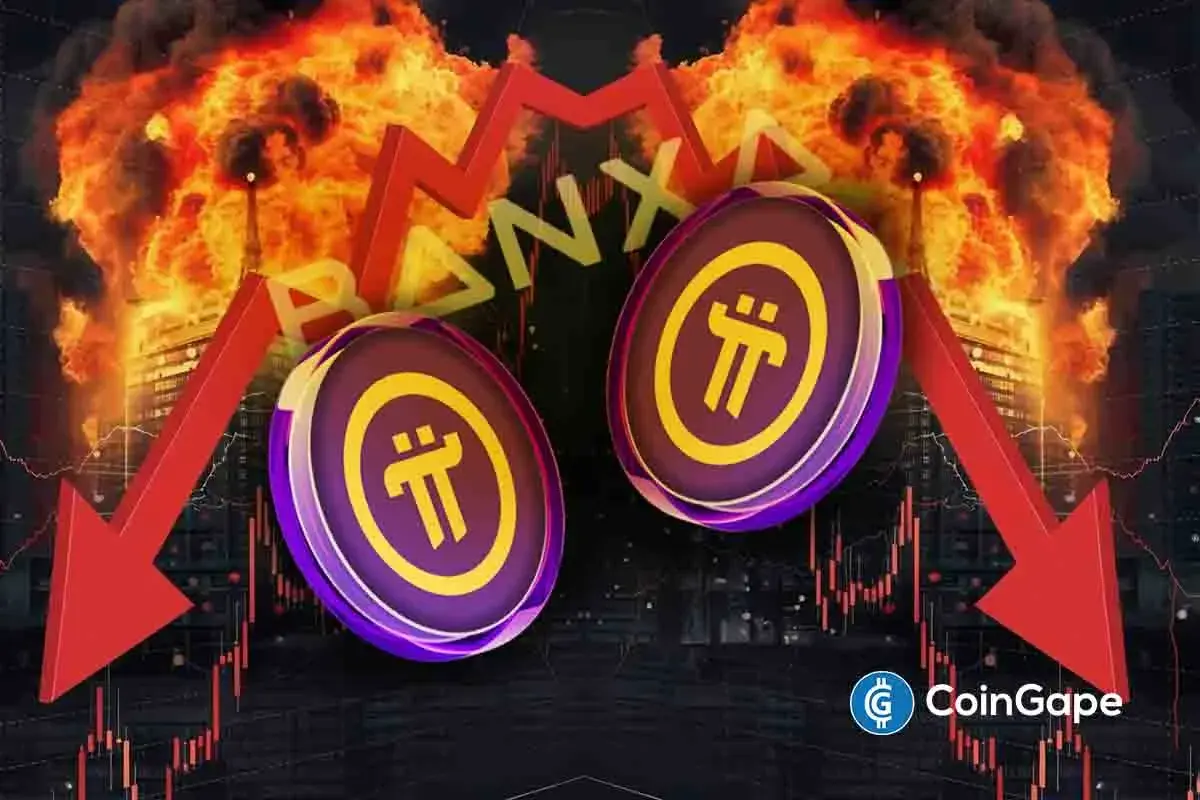
 Altcoin20 hours ago
Altcoin20 hours agoExpert Predicts Pi Network Price Volatility After Shady Activity On Banxa
-

 Altcoin24 hours ago
Altcoin24 hours agoDogecoin Price Breakout in view as Analyst Predicts $5.6 high
-

 Ethereum16 hours ago
Ethereum16 hours agoEthereum Fee Plunges To 5-Year Low—Is This A Bottom Signal?
-

 Altcoin23 hours ago
Altcoin23 hours agoTron Founder Justin Sun Reveals Plan To HODL Ethereum Despite Price Drop
-

 Market18 hours ago
Market18 hours agoIs XRP’s Low Price Part of Ripple’s Long-Term Growth Strategy?
-

 Altcoin21 hours ago
Altcoin21 hours agoAnalysts Predict XRP Price to Hit $6 as Wave 2 Correction Nears End
























